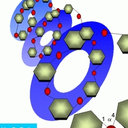Postsurgery enteral nutrition in head and neck cancer patients.
Keywords
Coimriú
OBJECTIVE
Patients with head and neck cancer undergoing surgery have a high incidence of postoperative complications. The aim of our study was to investigate whether postoperative nutrition of head and neck cancer patients, using an arginine-enriched diet, could improve nutritional variables as well as clinical outcomes.
METHODS
Randomized clinical trial.
METHODS
Tertiary care.
METHODS
A population of 47 patients with oral and laryngeal cancer were enrolled.
METHODS
At surgery patients were randomly allocated to two groups: (a) patients receiving an enteral diet supplemented with arginine and fiber (group I); (b) patients receiving an isocaloric, isonitrogenous enteral formula (group II).
RESULTS
No significant intergroup differences in the trend of the three plasma proteins and lymphocytes were detected. Gastrointestinal tolerance (diarrhea) of both formulas was good (17.4% group I and 8.3% group II; NS). During the 3 months after hospital discharge five patients died; no differences were detected between groups (13% group I and 8.3% group II; NS). The incidences postoperative infection complications were similar (nine patients) in both groups (21.7% group I and 16.7% group II; NS). Fistula were less frequent in enriched nutrition group (0% group I and 20.8% group II; P<0.05); wound infection was more frequent in group II, but without statistical difference (4.3% group I and 12.5% group II; NS). The length of postoperative stay was 22.8+/-11.8 days in the enriched group and 31.2+/-19.1 days in the control group (P=0.07).
CONCLUSIONS
In conclusion, enriched formula improves local wound complications in postoperative head and neck cancer patients. Our results suggest that these patients could benefit from an immunonutrient-enhanced enteral formula.



